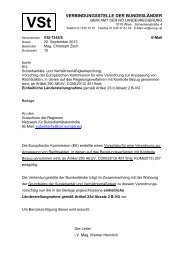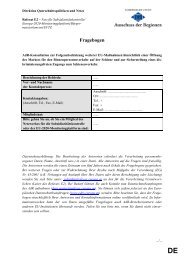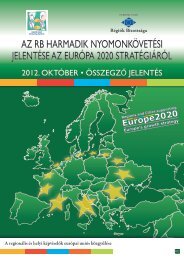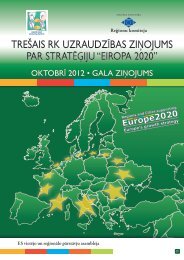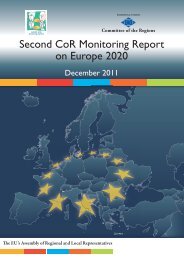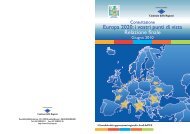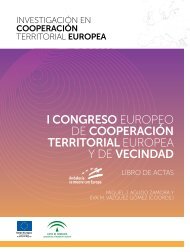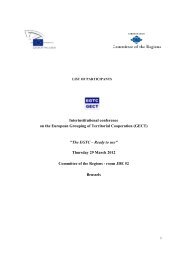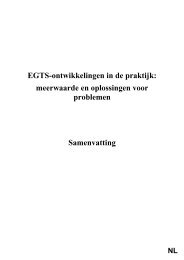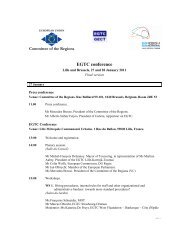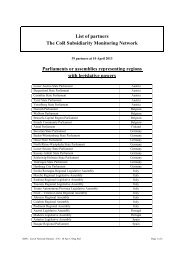2013 EGTC flyer_nw_EN - Sign In - Europa
2013 EGTC flyer_nw_EN - Sign In - Europa
2013 EGTC flyer_nw_EN - Sign In - Europa
Create successful ePaper yourself
Turn your PDF publications into a flip-book with our unique Google optimized e-Paper software.
Platform of European Groupings<br />
of Territorial Cooperation<br />
© CoR, June <strong>2013</strong><br />
A TOOL TO EMPOWER REGIONS AND CITIES<br />
‘<strong>EGTC</strong>’ stands for ‘European Grouping of Territorial Cooperation'.<br />
<strong>EGTC</strong> enable public entities from different Member States<br />
to come together to create a new body with legal personality<br />
under European Law.<br />
The <strong>EGTC</strong> was established by Regulation (EC) No 1082/2006<br />
of the European Parliament and of the Council. The Member<br />
States have implemented this legislation at national level. Since<br />
then, the number of <strong>EGTC</strong> created has been steadily growing.<br />
Following the recommendations of the CoR, the EU institutions<br />
are revising the legal framework to make the creation and the<br />
functioning of the <strong>EGTC</strong>s easier, and to give them more scope<br />
of action<br />
DELIVERING GROWTH AND OPPORTUNITIES<br />
The <strong>EGTC</strong> can carry out many types of cooperation action<br />
with a view to strengthening the economic, social and territorial<br />
cohesion of the European Union.<br />
They can implement cross-border, transnational or interregional<br />
cooperation programmes and projects, co-financed by the<br />
structural funds or other EU funds, or they can carry out tasks<br />
without European co-funding. The limits are the activities of<br />
police, justice or foreign policy tasks.<br />
The <strong>EGTC</strong> can be a tool for multi-level governance and for<br />
implementing the Europe 2020 Strategy, boosting competitiveness<br />
and sustainability.<br />
HOW IS IT SET UP?<br />
What is the <strong>EGTC</strong>?<br />
The regions, territorial authorities, municipalities, public law<br />
bodies and associations have the right to set up an <strong>EGTC</strong><br />
should they wish. National bodies may also participate.<br />
They must sign a convention, adopt a statute and receive the<br />
final authorisation of the Member States involved.<br />
An <strong>EGTC</strong> must have, at least, an assembly and a director.<br />
Newly-created <strong>EGTC</strong> must inform the Committee of the Regions.<br />
38 <strong>EGTC</strong>s registered<br />
Abaúj - Abaújban<br />
Alzette Belval<br />
Amphictyony<br />
ArchiMed<br />
Arrabona<br />
Bánát - Triplex Confinium<br />
Bodrogközi<br />
Duero - Douro<br />
Espacio Portalet<br />
EUKN<br />
Euregio Tirolo - Alto Adige - Trentino<br />
Euregio Senza Confini<br />
Euro-GO Gorizia - Nova Gorica - Šempeter-Vrtojba<br />
Eurometropolis Lille-Kortrijk-Tournai<br />
European Park Alpi Marittime - Mercantour<br />
Eurodistrict Saar Moselle<br />
Eurodistrict Strasbourg - Ortenau<br />
Euroregion Aquitaine-Euskadi<br />
Euroregion Pyrénées - Méditerannée<br />
Efxini Poli - SolidarCity Network<br />
Gate to Europe<br />
Galicia - Norte Portugal<br />
Hospital de La Cerdanya<br />
<strong>In</strong>terreg Programme Grande Région<br />
Ister-Granum<br />
Karst-Bodva<br />
Linieland van Waas en Hulst<br />
Novohrad - Nógrád<br />
Pannon<br />
Pons Danubii<br />
Pirineus - Cerdanya<br />
Rába-Duna-Vág<br />
Sajó-Rima/Slaná-Rimava<br />
TRITIA<br />
UTTS - Ung - Tisza - Túr - Sajó<br />
Via Carpatia<br />
West-Vlaanderen/Flandre-Dunkerque-Côte d´Opale<br />
ZASNET<br />
Contact us: egtc@cor.europa.eu<br />
<strong>In</strong>formation available in: www.cor.europa.eu/egtc<br />
Rue Belliard/Belliardstraat, 101 –1040 Brussels — Belgium<br />
T +32 (0) 2 282 2211— F +32 (0) 2 282 2325 ww.cor.europa.eu
<strong>EGTC</strong>s in the Alpine Area<br />
<strong>Europa</strong>region Tirol – Südtirol - Trentino<br />
Euroregione Tirolo - Alto Adige - Trentino<br />
www.europaregion.info<br />
The <strong>EGTC</strong> was registered in 2011 after a long history of cooperation as Euroregion. This <strong>EGTC</strong> supports<br />
the historical and cultural links between the member regions through cooperation in various policy fields<br />
such as energy, economy, transport and mobility (with particular attention to the Brenner green corridor),<br />
health, tourism, education, research and youth policies.<br />
Euregio Ohne Grenzen<br />
Euregio Senza Confini<br />
www.regione.veneto.it/web/decentramento-e-federalismo/gect<br />
This <strong>EGTC</strong> was created in December 2012, grouping the land of Carinthia and the regions of Veneto and<br />
Friuli-Venezia Giulia. The goals of the Euroregion are the promotion and the development of the territory<br />
of the three partner Regions.<br />
Parc européen / Parco europeo<br />
Alpi Marittime - Mercantour<br />
www.marittimemercantour.eu<br />
Unique geology and exceptional biodiversity will be protected across the borders. This <strong>EGTC</strong> has been<br />
created in <strong>2013</strong> and will implement the common projects of 'Le Parc national du Mercantour' and 'Le<br />
parco Naturale Alpi Marittime'. The <strong>EGTC</strong> creates a genuine European park, consolidating more than 30<br />
years of cooperation.<br />
GECT GO<br />
EZTS GO<br />
www.euro-go.eu<br />
This <strong>EGTC</strong> consolidates a cooperation dating from 1964. It was established to overcome difficulties in<br />
developing and managing territorial cooperation activities under different national legislation and procedures,<br />
bringing together the cities of Gorizia, Nova Gorica and Šempeter-Vrtojba.<br />
Join the <strong>EGTC</strong> Platform<br />
www.cor.europa.eu/egtc<br />
egtc@cor.europa.eu<br />
@<strong>EGTC</strong>platform<br />
<strong>EGTC</strong>-European Grouping<br />
of Territorial Cooperation<br />
Rue Belliard/Belliardstraat, 101 –1040 Brussels — Belgium<br />
T +32 (0) 2 282 2211— F +32 (0) 2 282 2325<br />
www.cor.europa.eu © CoR, <strong>2013</strong>



